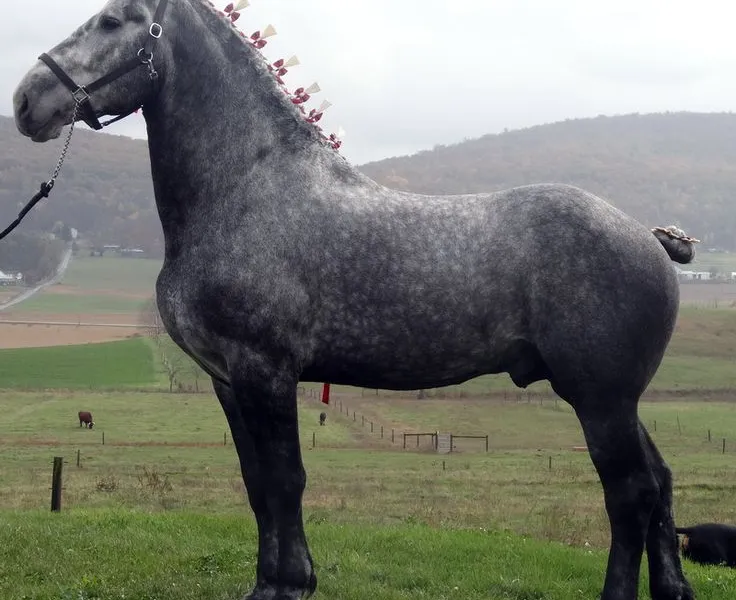The Percheron is a versatile breed that has been used for centuries in a variety of ways. These horses are known for their large size, hardiness, and gentle disposition.
If you’re thinking about adding a Percheron to your herd, here’s what you need to know.
Percheron Breed Info
Here are some of the key things you need to know about the Percheron:
| Height (size) | 15.1 – 18.1 hands high |
| Colors | Most commonly gray or black |
| Country of Origin | France |
| Common Uses | Draft work, meat production, logging, riding |
Percheron Facts & Information (Breed Profile)
The precise Percheron’s origin has been lost to time.
Some people think that they descended from the horses that were in the area during the Ice Age, while others think that they are closely linked to the Boulonnais horse that was used during the Roman invasion of Bretagne in 56 BC.
Others claim the breed is descended from Abd el Rahman’s Arab stallions, or from the horses used by the invading Moors at the Battle of Tours (in 732), which were distributed among the victorious French army.
What is known, however, is that local mares from the Le Perche region of France were crossed with Arab stallions at least twice in history – the first time was in the Middle Ages, and the second time was somewhere between the late 1700s and the early 1800s.
They were first bred as battle horses, and during the time of the crusades, the Percheron had already gained widespread acclaim for his exceptional substance and soundness as well as his distinctive beauty and elegance.
In the late 1800s, exports of Percherons from France to the United States and other countries rose exponentially, and in 1893 the first exclusively Percheron stud book was published in France.
The British military relied heavily on this breed during World War I.
70% of the draft horses in the United States in the 1930s were Percherons, but after World War II, their population drastically decreased.
Today, things are looking up, and since 2009 over 1,500 horses are registered each year in the United States alone.
If you’re interested in learning more about this fascinating breed, keep reading!
Alternative Names
n/a
Temperament/Personality
Intelligent, easy to train
Physical Characteristics
The head features a straight profile.
The forehead is wide, with big eyes and small ears.
The chest is broad and deep.
The croup is level and long.
The legs are clean and strong.
The feet and legs are clean and muscled.
Overall they are proud and alert, and adapt well to different circumstances and environments.
Colors
Most commonly gray or black
Height (size)
15.1 – 18.1 hands high
Stallions
n/a
Mares
n/a
Weight
1,100 – 2,600 lbs (500 – 1,200 kg)
Blood Type
Cold
Common Uses
Draft work, meat production, logging, riding
Health
n/a
Popular Traits
n/a
Feeding/Diet
Easy keepers
Country of Origin
France
Ancestors
Unknown
